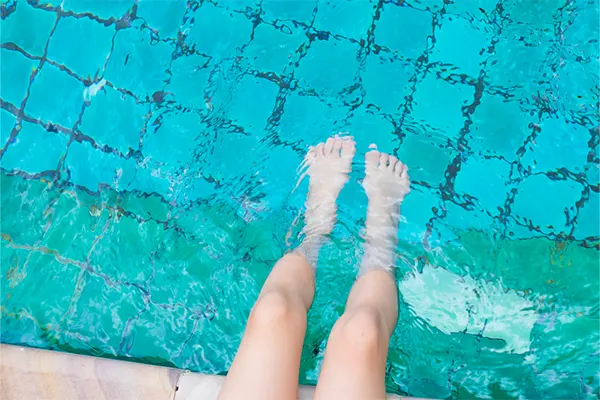TABLE OF CONTENTS
When cleaning and maintaining pools, homeowners should take extra care with the different chemicals used. This is because chemicals such as chlorine and calcium have adverse effects once they come into contact with the skin and eyes, or when ingested or inhaled. During a pool shock, the chemicals are meant to kill contaminants and algae, but can have adverse health effects on the user. This is especially true when performing a pool shock since the chemicals are usually in very high concentrations. Among the many concerns most homeowners have is what happens when one inhales pool shock accidentally. This article looks at exactly that.
Effects of Inhaling Pool Shock
• Irritation of the Respiratory Tract
Upon reaching the respiratory tract, pool shock triggers the release of excessive mucus by the membranes along the tract. This includes the nose, chest, throat and lungs. Over production of mucus by the tract membranes is in a bid to counterattack the contaminants in the shock. As more mucus is produced, one may experience persistent coughing, lots of mucus production through the nose, soreness in the nose, and tightness in the chest
• Chemical Burns
Pool shock chemicals such as sodium and calcium hypochlorite are highly caustic and are known to cause chemical burns on moist contacts. Upon coming into contact with moist contacts such as the epithelial cells of the respiratory tract organs such as nose, throat and lung tissues, they may cause burns. As this happens, the cells become inflamed, something that causes very sharp pains. Due to damaged tissues, secondary infections and complications may occur.
• Pulmonary Edema
This is simply a condition associated with shortness of breath, anxiety and a feeling of suffocation because of inhaling contaminants such as pool shock chemicals. In a bid to counter the contaminants, the alveoli of the lungs is filled with fluids and impedes the uptake of oxygen by the lungs, hence shortness of breath or suffocation.
• Asthma or Bronchitis
Upon inhaling pool shock chemicals, individuals may develop asthma or bronchitis. The situation may deteriorate if the individual is already living with the condition, where an asthma attack is imminent. An asthma attack is manifested by wheezing, coughing and over production of mucus.
What to do After Inhaling Pool Shock
Inhaling pool shock irritants can deteriorate in a very short time. For instance, people with pre-existing conditions like asthma may experience asthma attacks or near suffocation. Upon inhaling an irritant from pool shock, you should first flee the area of contamination and seek fresh air. If possible, move outside where there is free flow of fresh air. Then, call for medical help as soon as possible.
How to Stay Safe from Pool Shock
• Read Usage Instructions Carefully and Use Protective Gear
Before embarking on using any chemical, check the labels carefully and be sure to understand all the usage instructions. In addition, you should always arm yourself with PPE like goggles, protective clothing, gloves, and a respirator when dealing with chemicals like those used for pool shock. With PPE, contaminants cannot reach your eyes, nose and the skin.
• Use in Well Ventilated Areas
Always handle pool shock in well-ventilated areas. If possible, mix chemicals outside to ensure maximum ventilation. Well-ventilated areas reduce the amount and chances of exposure and contamination.
• Handle Chemicals Safely
Never at one time, try adding pool shock to other chemicals. Doing so can trigger severe reactions and sometimes explosions that could cause severe physical injuries. You should also note that pouring water into chemicals triggers chemical reactions that could go from mild to near explosion in a blink of a second. In this understanding, you should add chemical to water and not vice versa. In addition, when dealing with chemicals like pool shocks, never drop the container, follow the manufacturer instructions faithfully and dispose of the cans responsibly.
• Store Chemicals Safely
Always have a designated place for storing pool shock and other pool chemicals. This can help protect children from exposure and contamination. If possible, store them in high-level shelves in utility rooms to keep them out of reach of children.
In conclusion, you can avoid all the above-discussed adverse effects by contracting pool professionals like us at Artificial Rock Works. Our professionals are adequately skilled and experienced in proper handling pool shock and other pool chemicals. If for instance, you have a pre-existing condition like asthma, why go through the risk that could cost your life, while you could leave the task to the right people?




